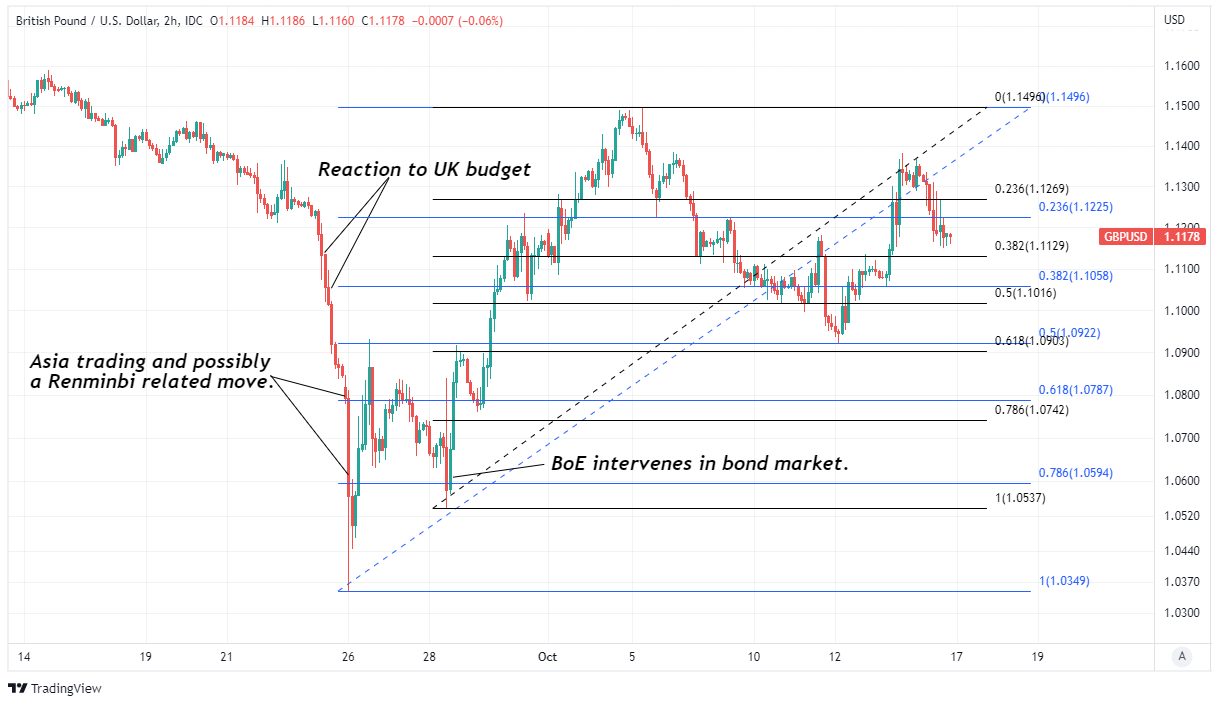GBP/USD Week Ahead Forecast: Banana Republic of Westminster Eyed
- Written by: James Skinner
-
- GBP/USD needs USD setback to build recovery
- UK political instability & uncertainty posing risks
- UK CPI, BoE rate implications also key for GBP
- U.S. manufacturing surveys & speeches ahead

Image courtesy of Aurelien Guichard, accessed Flickr, reproduced under Creative Commons licensing conditions.
The Pound to Dollar exchange rate has rebounded sharply in recent trade but could need a setback for the Dollar to rise further this week and partly because Sterling faces risks associated with the prospect of another Prime Minister being ousted from office in the Banana Republic of Westminister.
Sterling benefited last week when it emerged that HM Treasury could set aside some of the spending commitments announced in the late September fiscal statement but enters the new week with political instability and uncertainty once again high on the agenda.
This after widespread reports at the weekend (an example) suggesting that the less directly electable elements of the governing party are seeking to rewrite the party rule book in order to force the latest Prime Minister out of office, or to otherwise force a resignation of her newly-acquired post.
“Against this backdrop, it is worth trying to plot (sic) where any such an unprecedented coup d’état would lead us, or rather descend us into,” says Dr Savvas Savouri, chief economist and partner at Toscafund Asset Management, a London-based hedge fund with around $4BN under management.
"If you imagine what we have just experienced is as serious a Sterling and Gilt crisis as one could get, wait and see what would happen in this alt-reality of Truss being defenestrated the way Johnson was by “their” party,” Savouri wrote in an early October economic briefing titled “stupid is as stupid does.”
All of this risks creating a government-in-name-only that would face pressure to legislate for an inevitably-fractious election and just as the economy heads toward what was already expected to be one of its steepest downturns for decades even before the recent turbulence in the bond market.

"The UK’s mini budget proved to be a traumatic blunder, with its chaotic aftermath resulting in active BoE crisis management. Even before the mini-budget speech ended on 23 Sep, a sell-off developed across GBP and gilts," says Taimur Baig, chief economist at DBS Group Research.
"Due to a confluence of fiscal sustainability doubts and inflation risks, the cumulative 3-day jump in UK rates was extraordinary—30y yield saw a surge of 121bps, more than double in magnitude of a 50bps move, which is itself already an extreme right-tail event," Baig said.
The recent rout in the government bond market has lifted financing costs sharply despite an intervention from the Bank of England (BoE) and led economists to anticipate that the new Chancellor will respond with steep cuts to public spending as part of an effort to put a lid on the debt-to-GDP ratio.
Some estimates more than £70BN will need to be saved over a multi-year period but this lost expenditure also means lost GDP and will not be the only headwind weighing on the economy as Bank of England (BoE) interest rate policy is also set to deepen the economic downturn.
"Hunt has flagged further changes to the mini budget in coming weeks. GBP could drop significantly if Hunt’s changes fall short of what is needed. There is little technical support for GBP/USD until 1.0705," says Joseph Capurso, head of international economics at Commowealth Bank of Australia.
"Trading in the UK government bond market will test the resolve of the Bank of England governor’s decision to end its temporary support program. If yields on UK government bonds surge this week, the BoE may be forced to restart its program," Capurso and colleagues wrote in a Monday research briefing.
While much ink will inevitably be spilled over Westminster this week, other things are equally as important for Sterling including the market response to Monday’s anticipated end of Bank of England intervention in the bond market.
The BoE has bought almost £20BN of government bonds since September 28 and an incident that was described by Governor Andrew Bailey on Saturday as a “liquidity event,” which led the BoE to intervene by the Wednesday following Friday, 23 September’s fiscal event.
Sterling has appeared to benefit from that intervention and so could be vulnerable to any fresh or further liquidity strains should they emerge, although Tuesday’s release of inflation figures for the month of September and the trajectory of the U.S. Dollar will both be important too.
"While we fraternise over Fed policy and how high the Fed could take the fed funds rate into 2023, UK politics and the impact on the UK gilt (bond) market and the GBP is firmly front and centre – the connection between British politics and the capital markets will almost certainly result in increased volatility for the GBP this week," says Chris Weston, chief market analyst at Pepperstone.
"In a world where we analyse the distribution of outcomes in markets, unless we get a true risk on vibe through markets, lifting equities higher, then it’s hard to see how the GBP rallies this week – the path of least resistance for the GBP is, therefore, lower," Weston said on Monday.
The economist consensus suggests that Wednesday's figures will show inflation rising back to 10% with the core inflation measure, which ignores energy and food prices, also rising from 6.3% to 6.4% in September outcomes that could have implications for BoE interest rate policy.
Economists have lifted forecasts for Bank Rate sharply since late September's fiscal statement while some market-implied measures of investor expectations have risen even further to suggest that Bank Rate could rise above 5% by the early months of the new year.
Wednesday's inflation data is the highlight of the week for the Pound but GBP/USD will also be sensitive to the general trajectory of the Dollar and that will depend at least in part on the details of U.S. manufacturing sector surveys set for release on Monday and Thursday and any implications for Federal Reserve (Fed) interest rate policy.
"After this month CPI inflation is expected to peak at 10.3% y/y in October due to the impact of the government’s energy price freeze announcement for households. Measures of underlying inflation should begin to carry more weight from that point," says Daria Parkhomenko, a strategist at RBC Capital Markets.
"In the US, Fed’s Bullard has left open the possibility of a 75bp rate hike in December, though caveated in Friday’s Reuters interview that it is too early to tell and stated that looking ahead, “2023 should be a data-dependent sort of year. It’s two-sided risk," Parkhomenko said on Monday.

